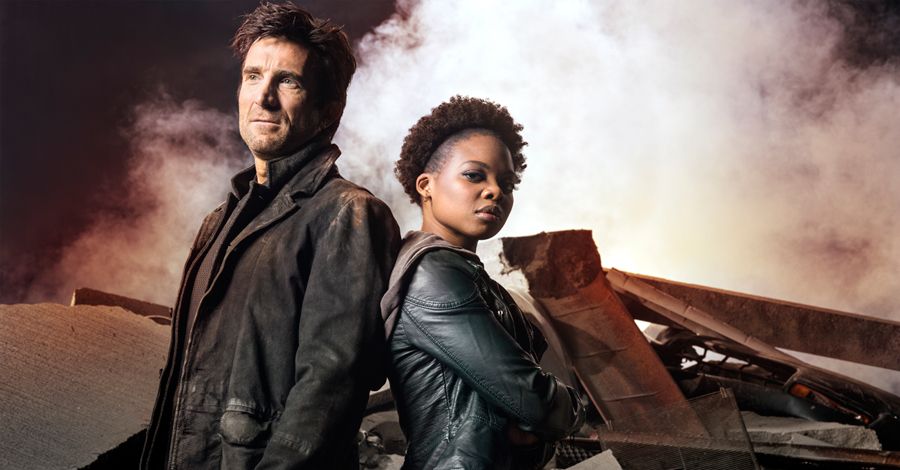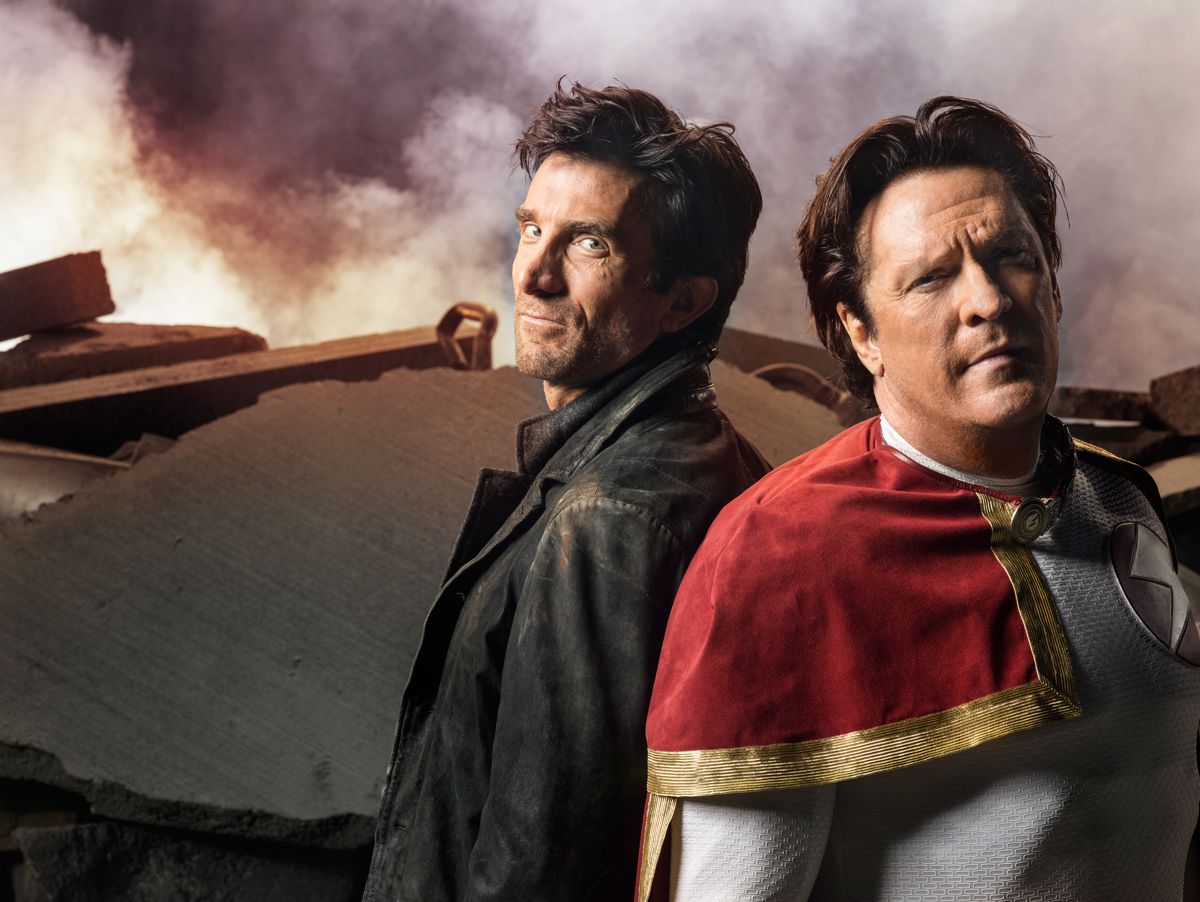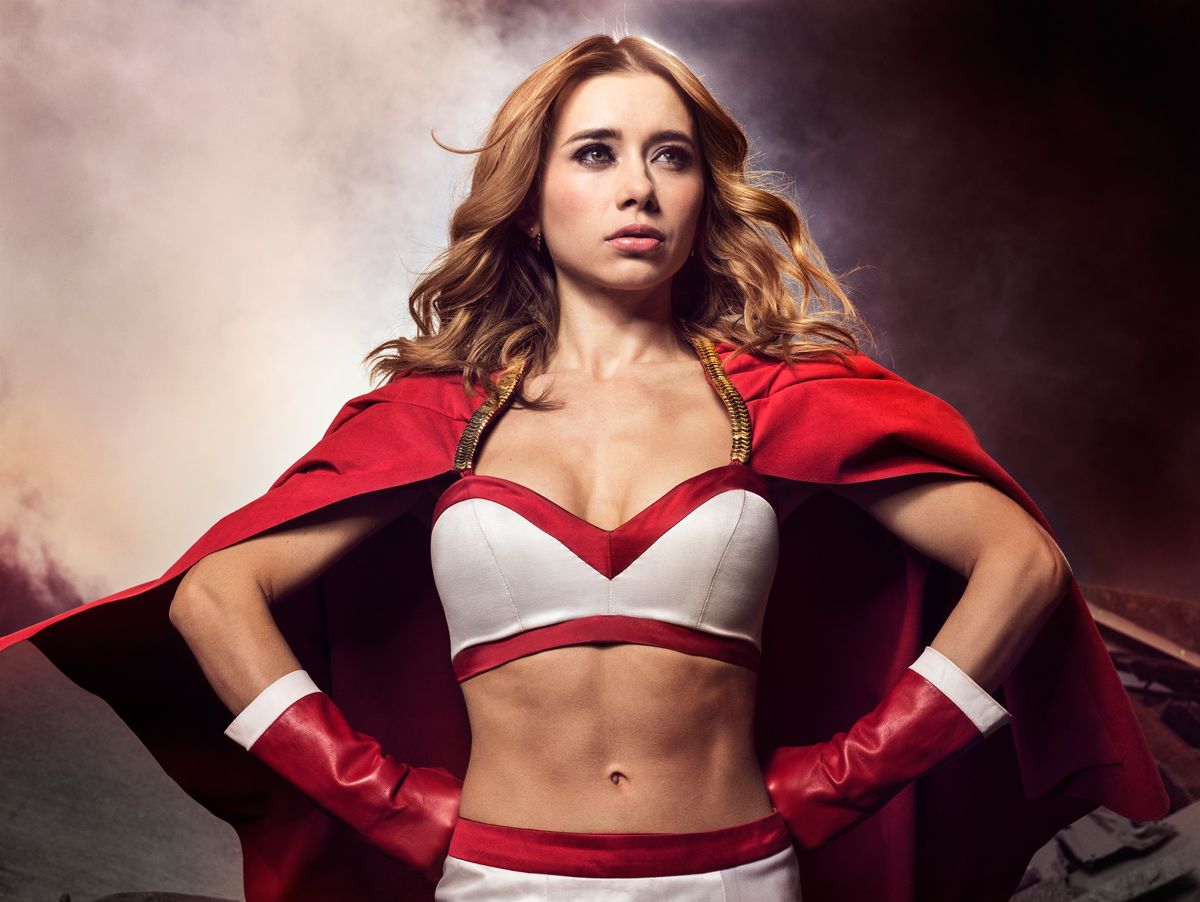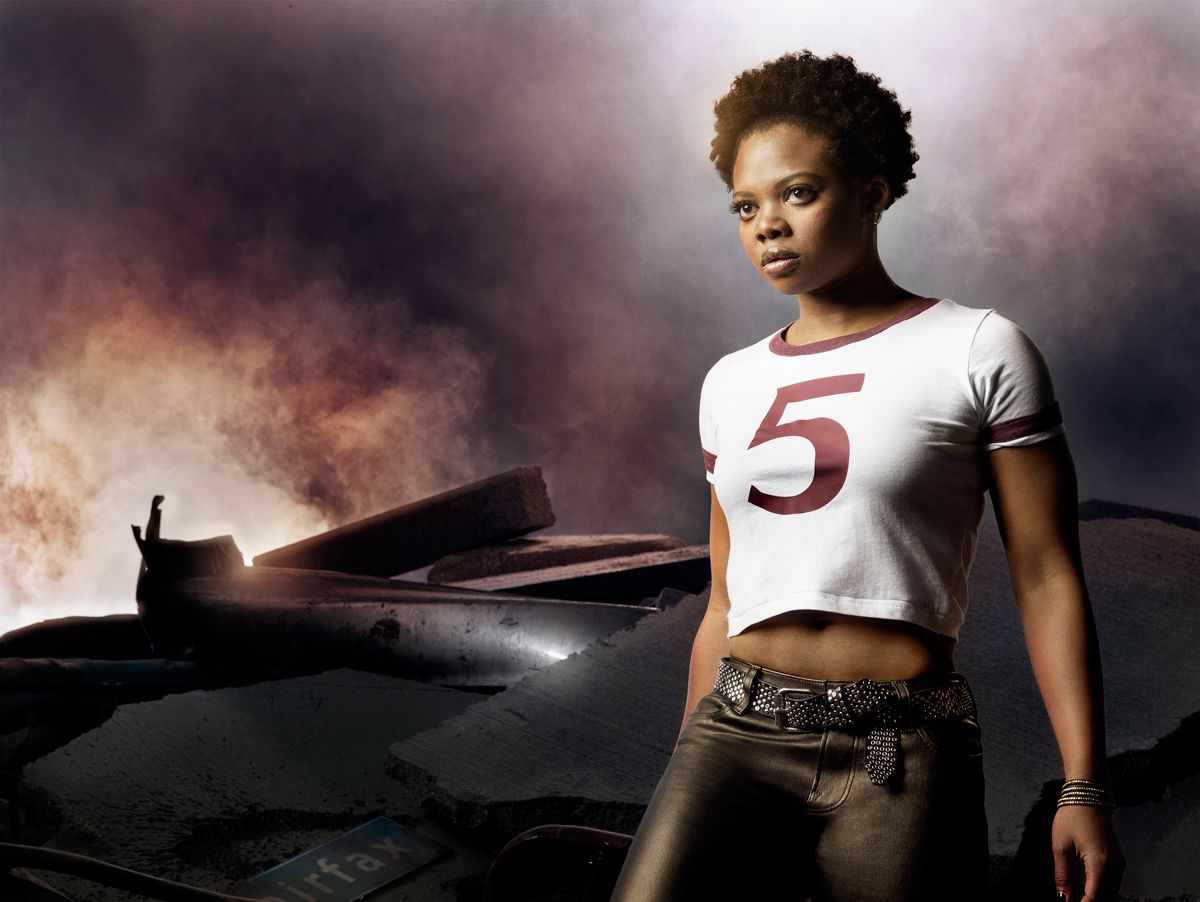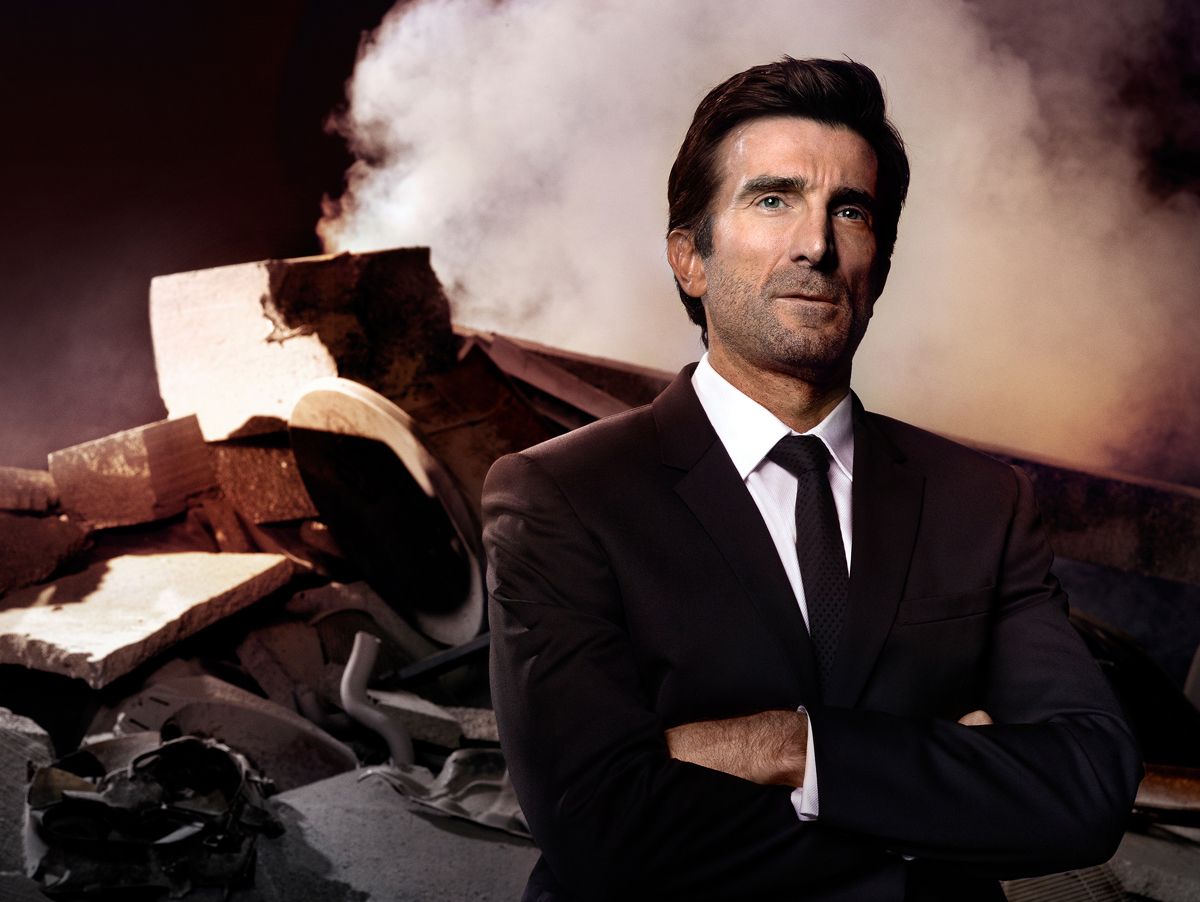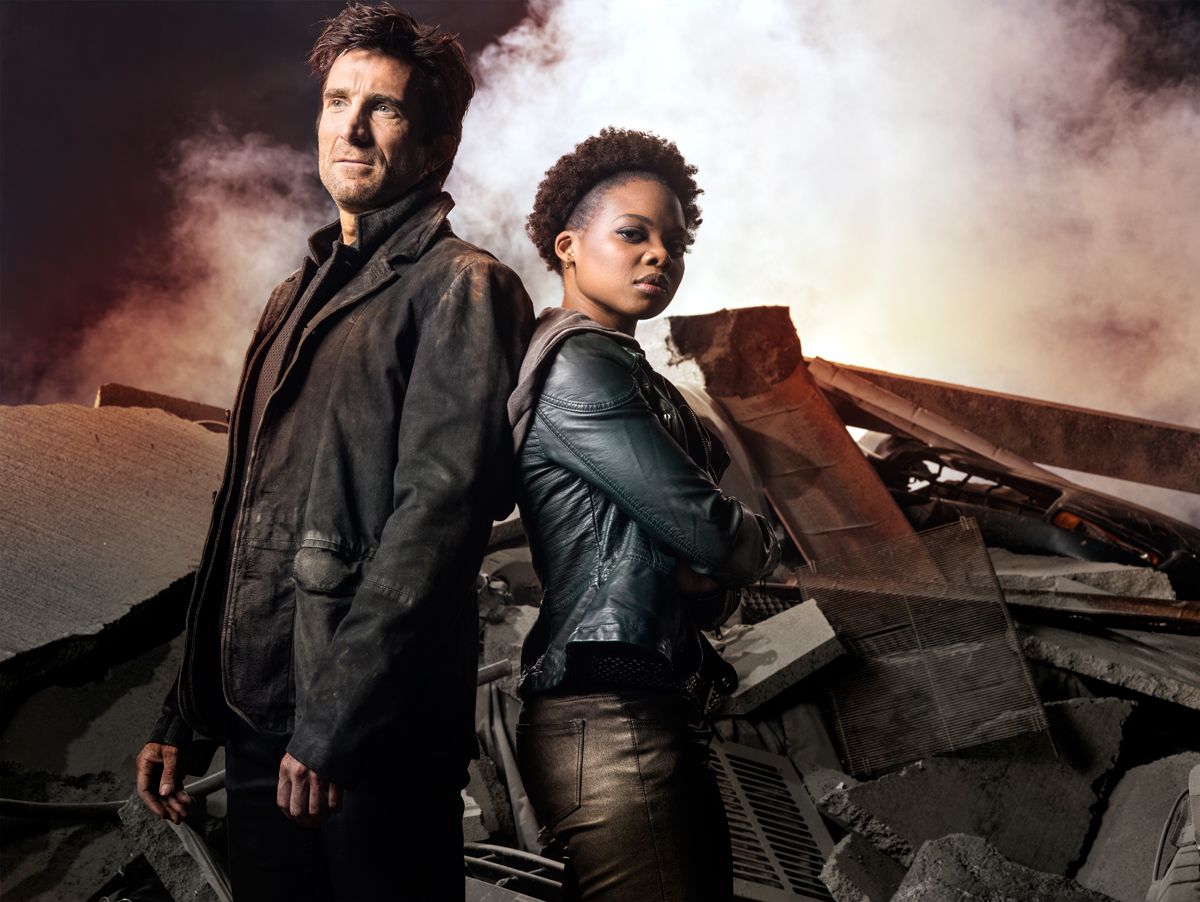Brian Michael Bendis and Michael Avon Oeming's creator-owned comics series "Powers" attracted Hollywood attention from the book's start at Image Comics in 2000, due to its snappy dialogue, distinctive artwork and clever take on both the crime and superhero genres. But attention only gets you so far in Hollywood, and "Powers" had a very, very long 15-year journey before debuting last year as the Sony PlayStation Network's first original, scripted TV series.
Despite the long road to live-action, "Powers" -- starring Sharlto Copley as Christian Walker and Susan Heyward as Deena Pilgrim -- received a mixed reaction from critics and fans in its first season. The show is back for a second season, with the first three episodes debuting today, following some significant changes behind the scenes -- including last year's departure of Charlie Huston as showrunner. The new season is set to adapt "Who Killed Retro Girl?," the acclaimed story arc that kicked off the "Powers" comic book, and Bendis and Oeming both took more hands-on roles in the making of the series, alongside showrunner Remi Aubuchon.
CBR News sat down with Bendis, Oeming and "Powers" executive producer David Engel last month at Emerald City Comicon in Seattle for a frank and free-wheeling chat about season two of the Sony series, significant changes including new castmembers like Michael Madsen and Tricia Helfer, and the unique experiences Bendis' kids have had on the "Powers" set.
CBR News: Brian, Mike, David -- with "Powers" season two coming, the intention seemed to be to have done things a little bit differently, and learn some lessons from season one. The show looks different based on the initial trailer. How did you approach season two?
Michael Avon Oeming: It's so hard to start something new. "Powers" already has a lot of challenges -- it's been around forever trying to get something made. You're taking two deconstructed genres and putting them together. It was all about getting a place to start, so hopefully we'd get to season two, then we could really figure out how to make it more like the comic. First we just need the machine functioning before anything. That was really the difference between the first season and second season. First season we were just building the structure of the house. Now we can put up all the cool shit.
Brian Michael Bendis: Almost all my favorite shows, when you think of it, you really think about that second season. "The Shield," even "Seinfeld." Even his refrigerator got better. There's a laundry list of shows like that, where the second season was like, "Here we go, now we got something." That's where we are. Remi and I are completely on the same page. He goes, "You know what we should do is really get some people behind the scenes that really blow the roof the place." Shawna [Trpcic], our costume designer, is Joss Whedon's costume designers. That's why all those costumes look amazing. She did "Firefly." Our cinematographer, Chris Faloona, did "Banshee" and "Torchwood," these really unique looking shows. Our stunt coordinator, Mike [Massa], is Harrison Ford's stunt coordinator on "Indiana Jones" and "Star Wars" -- these are big deal people.
You put all those elements together, and then we have all these awesome actors whose energies we now know because we've worked with them -- everything rose. We were set up at the end of season one to tell our best story, which is "Who Killed Retro Girl?," the first arc of the comic. It's where we started the world. The reason we did that in the comic was it, by the nature of its story, allows us to open the world up of "Powers." And that's exactly what we did.
David Engel: The baseball analogy for it -- they say the team that finished strong last year is going to be good this year.
The first season certainly seemed like like an interesting challenge in a few ways -- not only building the show itself, but it was also the first Sony PlayStation Network scripted series...
Bendis: Everything about it.
Oeming: There were no rules. At one point, everybody looked at each other and went, "Television has done X, Y and Z." But wait, we don't have the same distribution. We set our own ratings, basically. How far do we want to go? We weren't always sure how far we wanted to go or not go.
Bendis: I knew! [Laughs] That's why the road to "Powers" was so long, because it is an adult book for adults, and it goes into some seedy places sometimes. Sometimes for fun, sometimes for serious. It's an odd, unique look at superheroes that you can't do on network television. Even at FX, who were so nice to us, the whole time we were sitting there going, "Is this going to fit?" It's hard to imagine. Then when this was offered to us -- in a New York minute, that works. I like moves like that. I like coming into the place where there's no expectation and setting the level.
PlayStation has been amazing partners to us. They've been so generous to us. They know exactly what their audience is, and exactly what the audience watches on their platform. The one thing most mainstream media doesn't even cover is how many people watch television not on television. This is why we came to be here. That's the question people always ask: "Why are you on PlayStation?" Millions of people watch television on PlayStation every day. They know this for a fact. This is where they're watching "Game of Thrones," this is here they're watching "Walking Dead." So they're like, "We should put something on there that they don't get everywhere else, and make it part of their PlayStation lifestyle.
Oeming: Also PlayStation knows, statistically, their audience better than any television show, because it's coming from the console or the website. They know when people are pausing, how far into the show they're watching, what they're liking, what they're not. There's a good amount of data there you can't get from Netflix or another show. When I worked at Valve, you could see what kind of computer they were playing their games on, what kind of screen, what the resolution was.
Bendis: You can actually watch them do it! [Laughs]
Engel: Sony's also another partner with us on this project, because Sony Television and Features have been our partners on this since '00. They're the studio on it, and now the network is PlayStation. Sony Features and TV have been real strong supporters of their underlying material, because it's that good, for all these years. Credit to the film side; they recognized it early on, brought it to the TV side, who stayed with us, and they found their partner to be the network, which is PlayStation.
Oeming: There hasn't been all that hemming and hawing that you usually get. A lot of our past experience with "Powers" is trying to figure stuff out; maybe we shouldn't do that, or be afraid of that. They just let us do the comic. Do the best you can do.
Bendis: There's a gentleman named Chris Parnell, not the actor, at Sony who got "Powers" on the air, got "Preacher" on the air, got the "Boys" announcement, "Outlander." Really pulls things he truly loves and finds a home for them, sometimes at non-traditional places like us, and champions it.
It's nice. You've been to San Diego -- you've seen all these dudes walking around just trying to option shit. "Weasels," I like to call them. What you want is people that truly love the craft, and truly love the stories and the characters. We were lucky enough to partner up with someone who just really, really gets it. He's one of those guys behind the scenes that doesn't get enough credit. For everyone so excited about "Preacher" coming on the air, and "Powers" being on the air, it's this guy named Chris Parnell, who behind the scenes works as hard as any fan would work to make this stuff happen, and make it happen well.
In the spirit of things evolving and changing in season two, Brian and Mike, did your involvement step up at all?
Bendis: Totally. The first season, I was in the writers' room, I was available for whoever needed me for whatever they needed; I went out to Atlanta and was there for the shoot. It was a good experience, but then I went home. I went back to my awesome day job. But also, I'm a big believer in, everyone knows what they're doing, so let them do it. In my day job, I'm not going to stand over to Sara [Pichelli] while she draws "Spider-Man." She knows what to do. That's a philosophy that's served me well.
When the second season was coming along, the president of Sony called me at home and goes, "We're about to pull the trigger on season two, but you need to come to work." I'm like, "OK!" Over the course of the first season, Remi and I had discovered our friendship, and we're born of the same cloth. "Remi's going to run it, you're going to be right there with him. More writing from you, more involvement. We want the show to reflect the book more." Then, "Well, Mike's going to get in there and get his hands dirty, too." It went well. Everyone gets to look at what we've done and see what works, and the energy of the actors -- that's the magic. Just like in our day job with comics, you say, "Oh, they're really good at drawing this, I'm going to give them more of this to do." When we see the actors interacting in a certain way, you go, "Oh, I'm writing that. Look at them go."
Oeming: The energy between certain actors just pops.
Bendis: I lived in California for a little bit, running home to take care of my kids. Then my kids would come out there, then we were shooting in Atlanta, and then we lived in Atlanta for a few months, and my kids would come back and forth. They actually loved it. I was tortured about it -- I'm home all day. I'm not like a father that goes to work and comes home. I work at home. I'm there all day long. So when I'm there, I'm really not there. I was worried about it, but other people in show business do it all the time.
Oeming: It only makes the kids' worlds bigger. They see what you do, they're traveling.
Bendis: They loved it. I was so worried about it, and they loved it so much. My daughter Sabrina is obsessed with Susan. Meeting Susan was the most empowering thing that's happened in her life. She loved being on set. My daughter Olivia, she went right from cameoing on "Portlandia," which had nothing to do with me, to being on set on "Powers." We were shooting and she turned to me and Remi and goes, "I'm going to be a producer/director." He just turned to me and goes, "We ruined her." [Laughs] They loved it.
Adam Godley is on our show, he plays Captain Cross. Sabrina goes, "I know you." It was from "Charlie and the Chocolate Factory," he's Mike Teavee's dad. He goes, "Oh, you saw 'Charlie and the Chocolate Factory.'" She goes, "It's not my favorite movie. It's really not even my favorite Willy Wonka movie." The whole time this is going on -- I have a picture of it -- Logan [Browning] is sitting on a desk, just smiling ear to ear. Afterwards, Logan goes, "That is exactly me when I was eight years old."
All the new elements of the show -- Michael Madsen, Tricia Helfer.
Engel: Wil Wheaton.
Bendis: Episode 4 -- this is a sentence built for Comic Book Resources -- written by Ben Edlund, creator of "The Tick;" directed by Jonathan Frakes; with Wil Wheaton and Tricia Helfer. It is, I think, Tricia Helfer's best work as an actress, this episode. Fans, when they see what here deal is, are going to go nuts. Nuts! It may be the best episode of the season, and she is tremendous in it.
Engel: Part of the reason why season two was so much better is that the heads of Sony really, really got Brian and Mike involved. Credit to them for recognizing that you have to have the creators involved. That made a big difference in season two.
It's interested to hear how much you were involved in season two, because it's not like any of you were hands-off in season one.
Bendis: It's not that different from what Robert [Kirkman] does on "The Walking Dead." That was kind of, "Oh it can be done. You can not run the show, but involve yourself so strongly that you're helping." We've got the right people. It's smooth sailing.
The first three episodes of "Powers" season two debut today on the PlayStation Network.

